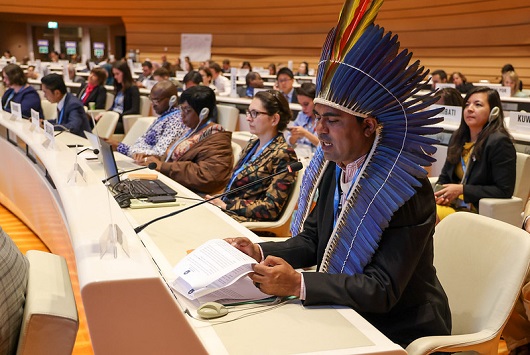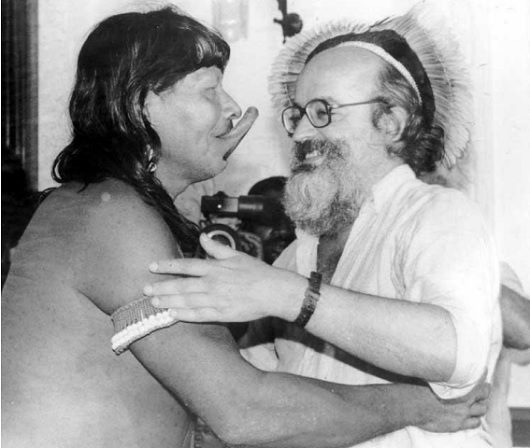Resolution on the Health of Indigenous Peoples: Fiocruz plays a prominent role in the 76th WHA
06/06/2023
Cristina Azevedo (Fiocruz News Agency)
The Resolution on the Health of Indigenous Peoples, unanimously approved at the 76th World Health Assembly, last Monday (5/29), had Fiocruz's stamp from its conception to the presentation in Geneva. The document establishes that the Director-General of the World Health Organization (WHO) develop a global action plan by 2026 and recommends actions to the member states – a step in which the Foundation should actively participate in Brazil.
The secretary of the Secretariat for Indigenous Health (Sesai), Weibe Tapeba, presents the resolution (photo: PAHO)
The proposal presented by Brazil and another 15 Member States, in addition to European Union countries, was considered pioneering. Among its main points, it states that governments must reduce inequalities in indigenous peoples' access to quality health services; encourage the recruitment and training of these peoples as health workers; and contribute to their training so as to enable them to perform monitoring and surveillance in indigenous territories, further incorporating traditional knowledge.
“The theme gained strength during the Assembly and began connecting to other issues, such as the climate”, explained Luiz Augusto Galvão, senior researcher at the Fiocruz Global Health Center (Cris/Fiocruz) and one of the authors of the text, led by the secretary of the Secretariat for Indigenous Health (Sesai), Weibe Tapeba. “The resolution is what is usually called soft law: it is not law, but aims to inspire rules of a regulatory nature in the member states. It is the great reference for actions on the matter”.
From expeditions to Geneva, passing through Arouca
The topic began being developed with the arrival of the Foundation's former president, Nísia Trindade Lima, at the Ministry of Health (MS) and the inauguration of Mario Moreira as president of Fiocruz. Paulo Buss, the coordinator of Cris/Fiocruz, began to discuss with the Center a set of topics to be forwarded to the minister, and Galvão – who worked at the Pan American Health Organization (PAHO) for 25 years, where he acted as chairman of the Internal Committee on Gender, Ethnicity, Human Rights and Equity – suggested indigenous health, at a time when Brazil was at the height of the Yanomami crisis.
The topic then caught the minister's attention. Weibe Tapeba embraced the idea and the project grew, with the inclusion of specialists from Fiocruz and the Special Advisory for International Affairs (Aisa, in the Portuguese acronym) of the Ministry of Health. The four members of Cris/Fiocruz (Buss, Galvão, Luana Bermudez and Paula Reges, also part of the National Institute of Infectious Diseases) were joined by Ana Lucia Pontes and Ricardo Santos, from the Sergio Arouca National School of Public Health (Ensp/Fiocruz); Luiza Carmelo, from Fiocruz Amazônia; and Marina Pitella, general coordinator for the Planning of International Health Affairs (Aisa/MS).
The proposal was then worked on by Aisa with Weibe and then discussed with the Brazilian mission in Geneva. In Switzerland, it was presented to the Executive Board by the secretary of Science, Technology, Innovation and Strategic Inputs in Health, Carlos Gadelha, and negotiated by ambassador Tovar da Silva Nunes with the countries, with Brazil, Bolivia, Mexico and Paraguay as Central States in the discussions. A side event to the Assembly, The Health of Indigenous Peoples, chaired by Weibe, was organized in view to promote the resolution, with the participation of representatives from Fiocruz, PAHO, WHO and the UN.
With the approval of the resolution, WHO has until 2026 to develop a strategic plan. In Brazil, Fiocruz will be able to support the actions of the Ministry of Health on the indigenous issue, as it has already been doing, as well as in other public health strategies. “Of the points of action presented at the Assembly, Fiocruz is able to act on almost all of them, being at least eight of them in the Resolution on the Health of Indigenous Peoples”, explained Galvão.
The Foundation may help in the construction of national plans, analyze the implications in public policies, collaborate in the training of qualified personnel in indigenous territories and in the formulation of a virtual library that ensures access, with ethical and respectful care, to knowledge of traditional medicine and specific health practices. In this sense, it operates in the production of knowledge, training of human resources and technical cooperation, in what the Foundation defined as “a way of rescuing the protagonism of the indigenous people in defining their own health agenda”.

In 1989, Arouca met Raoni Metuktire, a Brazilian indigenous leader of the Caiapó ethnic group, known internationally for his struggle to preserve the Amazon and indigenous peoples (photo: CCS/Fiocruz collection)
Fiocruz's work with the indigenous population goes back to the expeditions of the last century, through Sergio Arouca's presidency at the head of the institution. President between 1985 and 1988, Arouca advocated for the access of indigenous populations to health. Later a Congressman, he gave his name to the law that provides that “indigenous populations shall have guaranteed access to the SUS (Brazilian Unified Health System) at local, regional and specialized centers, according to their needs and comprising primary, secondary and tertiary health care”. It was another Fiocruz researcher, José Gomes Temporão, who, as minister of Health, created Sesai in 2010.
More recently, Fiocruz had an intense work with indigenous populations during the COVID-19 pandemic. The Foundation's work also involves graduate courses and technical cooperation work with indigenous peoples, government authorities, and movements. “A lot of what we learned, we learned from expeditions in indigenous territories. Fiocruz's history is closely linked to the indigenous populations”, said Galvão. “And Fiocruz was an essential partner of these peoples during COVID-19”.
For Galvão, the implementation of the resolution has challenges, such as the construction of a consistent work plan that integrates not only the issue of health, but also the protection of land and indigenous culture, which, once lost, cannot be recovered. He also remembered that in the meeting between minister Nísia and the CEO of COP 28, Ahmed al-Jaber, it was pointed out that many of the preserved lands and forest areas in the world are linked to indigenous populations.
Main points
The Resolution on the Health of Indigenous Peoples recommends that Member States survey the indigenous health situation ethically, identifying special needs and gaps in the access to and coverage of physical and mental health services.
The resolution encourages the recruitment and training of indigenous peoples as health workers. It was presented by Weibe Tapeba in a side event, with the participation of Galvão, sitting on the right (photo: Pamela Lang)
It provides that they should implement national health plans and strategies to reduce gender inequalities, as well as social, cultural and geographical barriers to equal access to quality health services. And that these services must be provided in indigenous languages.
It advocates universal access to sexual and reproductive health services, including family planning. And it recommends an intercultural and intersectoral approach in the development of public health policies, further taking into account the traditional knowledge of these peoples and their practices.
The resolution also provides for the recruitment and training of indigenous people as health professionals, as well as their qualification so as to conduct environmental and health monitoring in their territories, further providing for the protection of their culture. It also highlights the need to strengthen access to mental health services, care and adequate nutrition. The Assembly requested that the action plan be developed in consultation with the indigenous populations.




